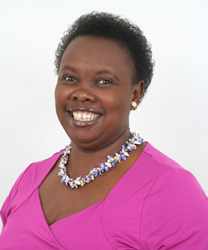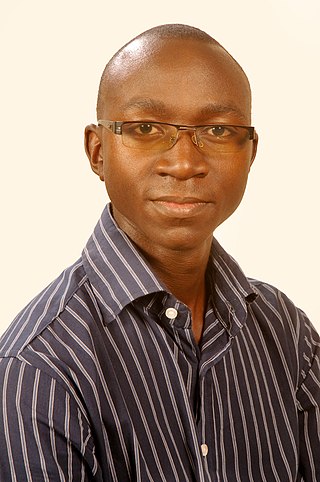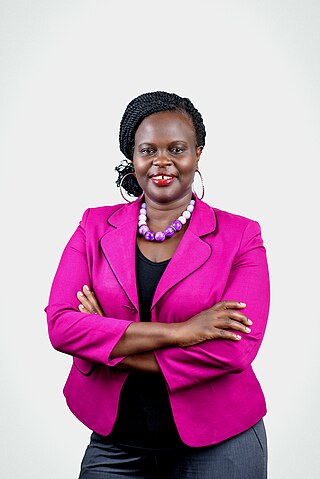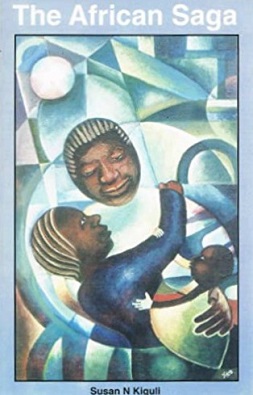
Timothy Wangusa is a Ugandan poet and novelist. Wangusa was chairman of Uganda Writers Association and founder president of International PEN Uganda Centre.

Monica Arac de Nyeko is a Ugandan writer of short fiction, poetry, and essays, living in Nairobi, Kenya. In 2007, she became the first Ugandan to win the Caine Prize for African Writing, with her story "Jambula Tree". She had previously been shortlisted for the prize in 2004 for "Strange Fruit", a story about child soldiers in Gulu, Northern Uganda. She is a member of FEMRITE – Uganda Women Writers Association and the chief editor of T:AP Voices. She taught literature and English at St. Mary's College Kisubi, before proceeding to pursue a Master's degree in Humanitarian Assistance at the University of Groningen. Her personal essay "In the Stars" won first prize in the Women's World, Women in War Zones essay writing competition. She has been published in Memories of Sun, The Nation, IS magazine, Poetry International and several other publications. She was one of the writers chosen as part of the Africa39 project unveiled by Rainbow, Hay Festival and Bloomsbury Publishing at the London Book Fair 2014, featuring a list of 39 of Sub-Saharan Africa's most promising writers under the age of 40.

Gabeba Baderoon is a South African poet and academic. She is the 2005 recipient of the Daimler Chrysler Award for South African Poetry. She lives and works in Cape Town, South Africa, and Pennsylvania, US, and serves as an assistant professor of Women’s, Gender and Sexuality Studies, African Studies and Comparative Literature at Pennsylvania State University. She divides her life between Port Elizabeth and Pennsylvania.
Mildred Kiconco Barya is a writer and poet from Uganda. She was awarded the 2008 Pan African Literary Forum Prize for Africana Fiction, and earlier gained recognition for her poetry, particularly her first two collections, Men Love Chocolates But They Don't Say (2002) and The Price of Memory: After the Tsunami (2006).
Felicity Plunkett is an Australian poet, literary critic, editor and academic.
Ayeta Anne Wangusa is a Ugandan writer and activist. A founding member (1995) of FEMRITE, the Uganda Women Writers Association, Wangusa first achieved broader recognition in literary circles for her novel Memoirs of a Mother (1998). She was also a founding member (2009) of the African Writers Trust, currently serving on the advisory board. She is a contributor to the 2019 anthology New Daughters of Africa, edited by Margaret Busby.

FEMRITE – Uganda Women Writers' Association, founded in 1995, is an NGO based in Kampala, Uganda, whose programmes focus on developing and publishing women writers in Uganda and—more recently—in the East African region. FEMRITE has likewise expanded its concerns to East African issues regarding the environment, literacy, education, health, women's rights and good governance.

Goretti Kyomuhendo is a Ugandan novelist and literary activist. A participant at the inaugural International Literature Festival Berlin in 2001, Kyomuhendo has been internationally recognised for her novels such as Waiting: A Novel of Uganda's Hidden War. She was the first Programmes Coordinator for FEMRITE—Uganda Women Writers Association, from 1997 to 2007. She founded the African Writers Trust in 2009, after her relocation to London, Great Britain, in 2008.
Violet Barungi is a Ugandan writer and editor. She has edited several publications published by FEMRITE. Her published books include the novel Cassandra. She has worked as a book Production Officer at the East African Literature Bureau (1972–77), senior Book Production Officer at Uganda Literature Bureau (1978–94) and an editor at FEMRITE.

The African Writers Trust (AWT) was established in 2009 as "a non-profit entity which seeks to coordinate and bring together African writers in the Diaspora and writers on the continent to promote sharing of skills and other resources, and to foster knowledge and learning between the two groups."

Ivan Matthias Mulumba is a Ugandan writer and valuation surveyor. He is the author of two collections of poems, Poetry in Motion and Rumblings of a tree, and a novel, The Honking. His work has appeared in The Kalahari Review, Reader's Cafe Africa, Africa Book Club, Munyori literary journal, Lawino-magazine, and Sooo Many Stories. He was nominated for the 2018 Young Achievers Awards.

Beverley Nambozo Nsengiyunva is a Ugandan writer, poet, actress, literary activist, and biographer. She is the founder of the Babishai Niwe (BN) Poetry Foundation formerly The Beverley Nambozo Poetry Award for Ugandan women, which began in 2008 as a platform for promoting poetry. It has since grown to include all African poets and runs as an annual poetry award. In 2014, the award will extend to the entire continent, targeting both men and women. The same year, the foundation will also publish an anthology of poetry from poets of Africa. She is also the founder of the Babishai Niwe Women's Leadership Academy. Nambozo joined the Crossing Borders Scheme British Council Uganda in 2003 under the short stories genre. She was nominated for the August 2009 Arts Press Association (APA) Awards for revitalising poetry in Uganda after initiating the Beverley Nambozo Poetry Award, the first poetry award for Ugandan women.
Phillippa Yaa de Villiers is a South African writer and performance artist who performs her work nationally and internationally. She is noted for her poetry, which has been published in collections and in many magazines and anthologies, as well as for her autobiographical one-woman show, Original Skin, which centres on her confusion about her identity at a young age, as the biracial daughter of an Australian mother and a Ghanaian father who was adopted and raised by a white family in apartheid South Africa. She has written: "I became Phillippa Yaa when I found my biological father, who told me that if he had been there when I was born, the first name I'd have been given would be a day name like all Ghanaian babies, and all Thursday girls are Yaa, Yawo, or Yaya. So by changing my name I intended to inscribe a feeling of belonging and also one of pride on my African side. After growing up black in white South Africa, internalising so many negative 'truths' of what black people are like, I needed to reclaim my humanity and myself from the toxic dance of objectification." She has also said: "Because I wasn't told that I was adopted until I was twenty, I lacked a vocabulary to describe who I am and where I come from, so performing and writing became ways to make myself up." As Tishani Doshi observes in the New Indian Express: "Much of her work is concerned with race, sexuality, class and gender within the South African context."

Hilda Twongyeirwe is a Ugandan writer and editor. For ten years, she taught English language and literature in secondary school, before she retired to do development work in 2003. She is an editor, a published author of short stories and poetry, and a recipient of a National Medal of the government of Uganda in recognition of her contribution to women's Empowerment through Literary arts (2018). She is also a recipient of a Certificate of Recognition (2008) from the National Book Trust of Uganda for her children's book, Fina the Dancer. She is currently the coordinator of FEMRITE, an organization she participated in founding in 1995. She has edited fiction and creative nonfiction works, the most recent one being, No Time to Mourn (2020) by South Sudanese women. She has also edited others including; I Dare to Say: African Women Share Their Stories of Hope and Survival (2012) and Taboo? Voices of Women on Female Genital Mutilation (2013).
Beatrice Lamwaka is a Ugandan writer. She was shortlisted for the 2011 Caine Prize for her story "Butterfly Dreams".
Lillian Tindyebwa is a Ugandan writer living in Kampala. She is the author of numerous books, notably the novel Recipe for Disaster, published in 1994 as part of the Fountain youth series. She is a founding member of FEMRITE, and the founder of Uganda Faith Writers Association.
Patrick Mangeni Wa’Ndeda a Ugandan writer, poet and playwright. He is the author of two plays, Operation Mulungusi, and The Prince, and a children's novel, The Great Temptation.
Iga Zinunula is a Ugandan poet and Veterinary Assistant. He has engaged in rural development work all over Uganda since 1990. He is a member of the editorial board of FEMRITE. He has been a judge at the Babishai Niwe (BN) Poetry Foundation.

The African Saga is a collection of poems by Ugandan poet Susan Nalugwa Kiguli. Published in 1998, it won the National Book Trust of Uganda Poetry Award (1999), It is a collection of 95 poems in four sections: “Poems of Protest”, “Relational Poems”, “Poems of Nature” and “Existential Poems”.








